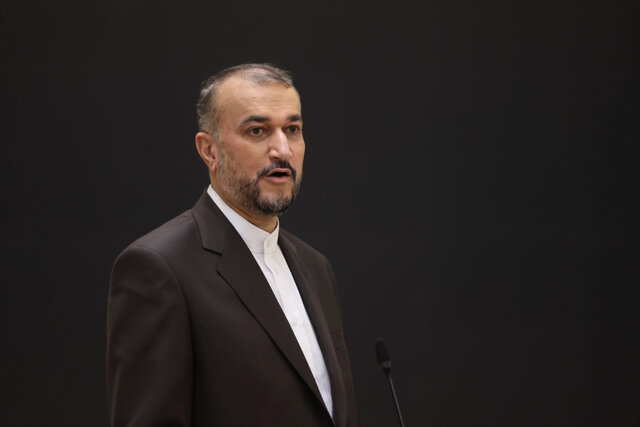Hossein Amirabdollahian, the Minister of Foreign Affairs of Iran, is currently on a visit to Geneva, a city renowned for its hosting of the largest number of international organizations worldwide.
Amirabdollahian’s visit to Switzerland serves as a continuation of Iran’s diplomatic endeavors concerning Palestine. During this diplomatic mission, the Iranian Foreign Minister will engage in discussions and consultations with select officials from the United Nations and the International Committee of the Red Cross to address international initiatives aimed at ceasing the ongoing conflict and facilitating the delivery of humanitarian aid to Gaza.
This visit occurs amid storming of the Al-Shifa Hospital in Gaza and also reports from international institutions and news media based in Gaza, highlighting the widespread destruction of the region’s urban and civilian infrastructure. Recent statistics indicate that over 11,500 civilians in Gaza have tragically perished during the thirty-eight days of conflict.
The International Committee of the Red Cross has documented the appalling living conditions in Gaza, along with a mass exodus of war-affected individuals. The committee’s report emphasizes the unbearable circumstances in Gaza under intense Israeli airstrikes, depicting a harrowing scenario where evacuees, including men, women, and children, are compelled to trek substantial distances without essential supplies such as food and water, while encountering deceased individuals strewn along the streets.
UNRWA has announced the imminent suspension of its services due to the lack of facilities in Gaza, underscoring the loss of its 101 employees in Israeli attacks since the commencement of the conflict. This unprecedented toll on UN personnel within a single month is unparalleled in the organization’s history.
In recent days, the International Committee of the Red Cross has underscored the catastrophic destruction of Gaza’s hospitals, highlighting the peril facing thousands of civilians, patients, and medical personnel.
Aligned with broader observations, the methods adopted by Israel in its Gaza operations, which contravene international treaties, are compounded by the obstruction of humanitarian aid delivery to civilians, in violation of humanitarian conventions during armed conflicts.
In a telephone conversation on October 11 with Mirjana Spoljaric Egger, the president of the International Committee of the Red Cross, Iran’s Foreign Minister condemned Israel’s assaults on Gaza and expressed the willingness of the Iranian Red Crescent to coordinate the provision of humanitarian aid to Gaza with the Red Cross.
During a meeting with the President of Egypt on November 11, on the sidelines of an emergency gathering of the Organization of Islamic Cooperation and Arab League in Riyadh, the President of Iran also reaffirmed Iran’s preparedness to dispatch humanitarian aid to Gaza through the Rafah crossing, seeking Egypt’s cooperation in this endeavor. However, reports indicate Egypt’s refusal to accept this aid due to Israel’s opposition to the transfer of Iranian assistance to Gaza via the Rafah border.
Despite widespread international appeals for a ceasefire and the reopening of international aid passages to the people of Gaza, these entreaties have remained unanswered. Efforts to broker a ceasefire mediated by Qatar in response to the escalating Israeli attacks on Gaza and the escalating casualties have thus far proved unsuccessful.
On Monday, the spokesman of al-Qassam, the military wing of Hamas, revealed that Qatar’s efforts to facilitate a prisoner exchange had been hindered by Israel’s delays and obstructions, preventing the agreement. The spokesman indicated that the Palestinian resistance movement had consented to a five-day ceasefire in exchange for the release of 50 women and children prisoners, contingent upon the reopening of routes for the delivery of humanitarian aid.
In the imminent discussions in Geneva, it is anticipated that Iran’s Foreign Minister will delve into the harsh tactics employed by Israel in the Gaza war. This discourse will likely involve dialogues and consultations with officials from various nations and delegates of international organizations.
Throughout previous discussions, Iran has articulated its grave concern over Israel’s use of chemical armaments and nuclear threats against Gaza. Consequently, it is plausible that the Iranian Foreign Minister will stress the urgency for international inquiries and preventative measures to curb any further atrocities in Gaza during the Geneva dialogues.
The ongoing conflict in Gaza has served as yet another test for the potency – or lack thereof – of international organizations, not least the United Nations Security Council, in their ability to halt warfare and avert humanitarian catastrophe. Despite this, the Council appears to have fallen short in effectively halting the extensive loss of Gazan lives resulting from Israel’s intense bombarding of urban precincts.






